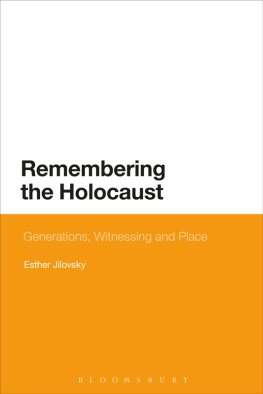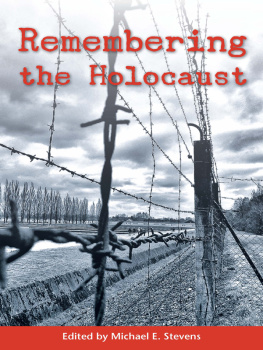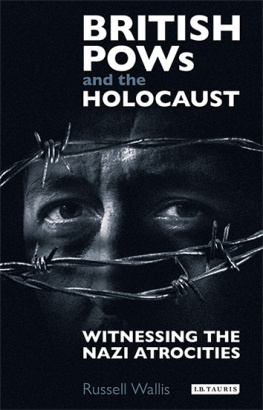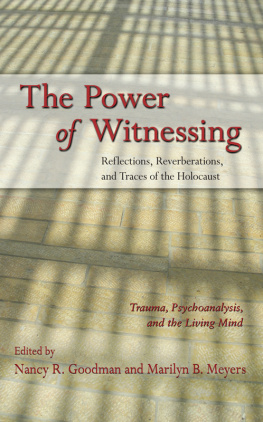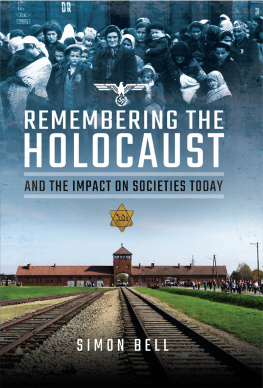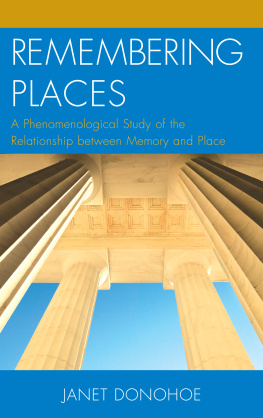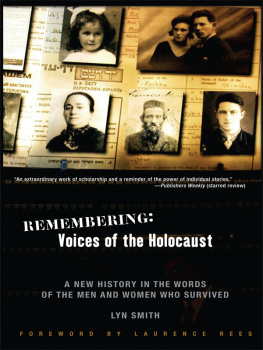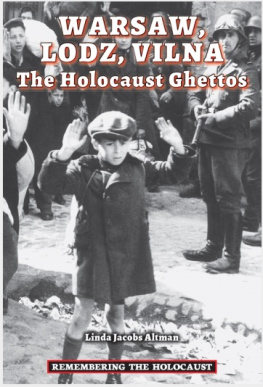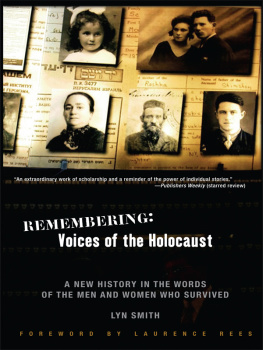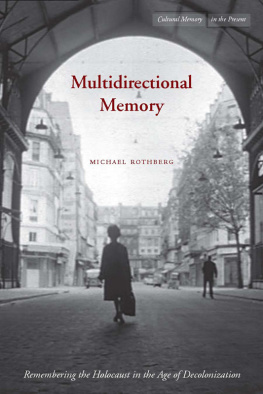Jilovsky - Remembering the Holocaust: generations, witnessing and place
Here you can read online Jilovsky - Remembering the Holocaust: generations, witnessing and place full text of the book (entire story) in english for free. Download pdf and epub, get meaning, cover and reviews about this ebook. City: New York ect, year: 2015, publisher: Bloomsbury UK;Bloomsbury Academic, genre: Home and family. Description of the work, (preface) as well as reviews are available. Best literature library LitArk.com created for fans of good reading and offers a wide selection of genres:
Romance novel
Science fiction
Adventure
Detective
Science
History
Home and family
Prose
Art
Politics
Computer
Non-fiction
Religion
Business
Children
Humor
Choose a favorite category and find really read worthwhile books. Enjoy immersion in the world of imagination, feel the emotions of the characters or learn something new for yourself, make an fascinating discovery.
- Book:Remembering the Holocaust: generations, witnessing and place
- Author:
- Publisher:Bloomsbury UK;Bloomsbury Academic
- Genre:
- Year:2015
- City:New York ect
- Rating:5 / 5
- Favourites:Add to favourites
- Your mark:
- 100
- 1
- 2
- 3
- 4
- 5
Remembering the Holocaust: generations, witnessing and place: summary, description and annotation
We offer to read an annotation, description, summary or preface (depends on what the author of the book "Remembering the Holocaust: generations, witnessing and place" wrote himself). If you haven't found the necessary information about the book — write in the comments, we will try to find it.
Jilovsky: author's other books
Who wrote Remembering the Holocaust: generations, witnessing and place? Find out the surname, the name of the author of the book and a list of all author's works by series.
Remembering the Holocaust: generations, witnessing and place — read online for free the complete book (whole text) full work
Below is the text of the book, divided by pages. System saving the place of the last page read, allows you to conveniently read the book "Remembering the Holocaust: generations, witnessing and place" online for free, without having to search again every time where you left off. Put a bookmark, and you can go to the page where you finished reading at any time.
Font size:
Interval:
Bookmark:
Remembering the Holocaust
Remembering the Holocaust
Generations, Witnessing and Place
Esther Jilovsky
Bloomsbury Academic
An imprint of Bloomsbury Publishing Plc

To my great-grandparents
Zyvia (18901919) and Dov Bernhard Hirschbein (18851941)
Elsa (18811942) and Gabriel Jilovsky (18781943)
who I did not know.
And to my grandparents
Hanka (19152009) and Kurt Jilovsky (19052002)
and my Dad
Martin Michael Jilovsky (19511999)
who I did know, and who I miss very much.
In 2002, I went to Auschwitz. On a hot midsummer day, I left nearby Krakow on a public bus and joined the millions of tourists who now visit this place annually. As the bus bumbled along rural roads and the sun burned down from a cloudless blue sky, contrasting pleasantly with the fresh green grass, I was not yet aware that my great-grandfather Gabriel Jilovsky had made a similar journey in December 1943. Fifty-eight and a half years later, the only thing our journeys in fact had in common was the destination. We both went to Auschwitz, but that is where the similarities end.
Here I could describe what happened to Gabriel. I could explain that he was transported to Auschwitz from the Nazi ghetto of Theresienstadt (Czech: Terezn), located in what is now a short drive from his home in Prague. I could explain that although he had lived in Prague since approximately 1915, he was actually from a small town called Liboch in German (Czech: Libchov), which, incidentally, is not that far from Theresienstadt. I could tell you that he was a businessman; he manufactured postcards and tops for walking sticks, popular with hikers in the countryside of Bohemia.
But none of this was evident to me at Auschwitz that day. I was greeted by a car park filled with tour buses. These lumbering beasts, decorated with brightly coloured lettering, stood silently at neat forty-five-degree angles. Hordes of tourists swarmed out of them and headed for the unremarkable looking entrance. As I walked from the bus stop, I overheard a fellow visitor exclaim enthusiastically to her companion: Lets go see some dead people! Along with the hordes I drifted into a non-descript entrance hall, and we settled down to watch a documentary film before entering the camp itself. It was not clear to me then that the car park lies on land which is part of the war-time Auschwitz. The confronting black and white footage accompanied by no-nonsense narration soon turned the holidaymakers bustling excitement into gasps of shock and horror.
The official tour of Auschwitz began a short distance away from the iconic Arbeit Macht Frei gate. I was astounded at how small it looked compared to all the pictures I had seen of it much like the Eiffel Tower or Buckingham Palace seem infinitely bigger in photos or on television. Our guide began by explaining
Yet, my overriding memory of Auschwitz is a collection of neat, red brick buildings. Walking around Auschwitz I, where former barracks had been fitted out with museum displays of objects taken from prisoners such as suitcases, glasses and hair, I sensed something was missing. Despite the grotesque nature of these things, they were silent. It all seemed so mundane. If a visitor did not know what had happened there, I thought, they could not necessarily tell just from visiting the place.
I did not know then that Gabriel had been murdered at Auschwitz. Would I have had a different experience during my visit if I had known? I might have looked more closely at the prisoners suitcases in case his was amongst them, for example. I might have tried to recognize his face in the black and white photographs of prisoners. I might have tried to find out what the life expectancy was for a 65-year-old Czech Jewish man newly arrived from a ghetto. I might have imagined his fate.
Our experiences with places are shaped by our knowledge about these places. This book arises from my experiences of visiting not only Auschwitz, but many other sites of Holocaust memory throughout Europe. Over the years, I read not only many Holocaust testimonies, but also accounts by descendants of Holocaust survivors who returned to trace their family history. I wondered if it really was possible to understand the past through visiting certain places. And I wondered how these places would shape the future of Holocaust memory.
Like many books, this one has taken several years to come to fruition. It began life in the cool days of an Oxford autumn and was completed in the balmy days of a Melbourne spring. Over the course of its creation, I benefitted from the help, guidance and support of many friends, colleagues and family members, and it is wonderful to have this opportunity to officially thank them.
First and foremost, my sincere thanks go to Zo Waxman, for her invaluable support, enthusiastic encouragement and gentle criticism of this project since its inception, and who continues to steadfastly support my work. I also thank Robert Eaglestone for his wise counsel and considered feedback which brought a new angle to the project. I thank Peter Longerich for his input and support.
I am most grateful for the funding I received to undertake this project. The School of Modern Languages, Literatures and Cultures at Royal Holloway, University of London awarded me the Thomas Holloway Research Studentship and the Overseas Research Studentship, and the University of Melbourne awarded me the Rae and Edith Bennett Travelling Scholarship in order to undertake the initial research for this project. The German Academic Exchange Service (DAAD) awarded me the Research Grant for Young Academics which enabled me to spend dedicated time in Berlin transforming the project into this book.
An early version of appeared as The Place of Memory or the Memory of Place? The Representation of Auschwitz in Holocaust Memoirs, in Karen Auerbach (ed.), Aftermath: Genocide, Memory and History (Clayton: Monash University Publishing, 2015), pp. 12039. I thank Colloquy, the Australian Journal of Jewish Studies and Monash University Publishing, respectively, for permission to reprint these essays.
I am most grateful to those who have taken the time to read over drafts of the manuscript. I thank Shirli Gilbert most sincerely for her unwavering support in the final stages, and for her incredibly useful and perceptive comments on the draft manuscript. Alison Lewis was always willing to listen and encourage, and her close reading produced wonderfully insightful feedback on drafts. Karen Auerbach provided unceasing encouragement, and valuable insights into my argument. I thank my colleagues Joe Blythe, Barbara Keys and Nesam McMillan, who carefully read manuscript drafts and provided me with feedback and encouragement to continue. I thank Rosalind Calver wholeheartedly for her wonderfully meticulous and careful proofreading. Thanks to Samuel Koehne for checking my German translation.
My colleagues in the School of Languages and Linguistics at the University of Melbourne, particularly Heather Benbow, Sarah French, Leo Kretzenbacher, Birgit Lang, Leonetta Leopardi, Katie Sutton, Sabina Vakser, Jana Verhoeven and Wendy Yap, have been most supportive and provided me with chai lattes and inspiration as required.
My editors Emma Goode and Rhodri Mogford at Bloomsbury Academic deserve huge thanks for always answering my emails promptly and for their long-standing and careful editorial support.
Karen Auerbach, Rosalind Calver, Joyce Chia, Anna Dziedzic, Sara Karin Fisher, Jayne Gartner and Fiona Machin never tired of listening to me talk about this book and shared many bottles of wine and pots of tea with me in the process.
Next pageFont size:
Interval:
Bookmark:
Similar books «Remembering the Holocaust: generations, witnessing and place»
Look at similar books to Remembering the Holocaust: generations, witnessing and place. We have selected literature similar in name and meaning in the hope of providing readers with more options to find new, interesting, not yet read works.
Discussion, reviews of the book Remembering the Holocaust: generations, witnessing and place and just readers' own opinions. Leave your comments, write what you think about the work, its meaning or the main characters. Specify what exactly you liked and what you didn't like, and why you think so.

